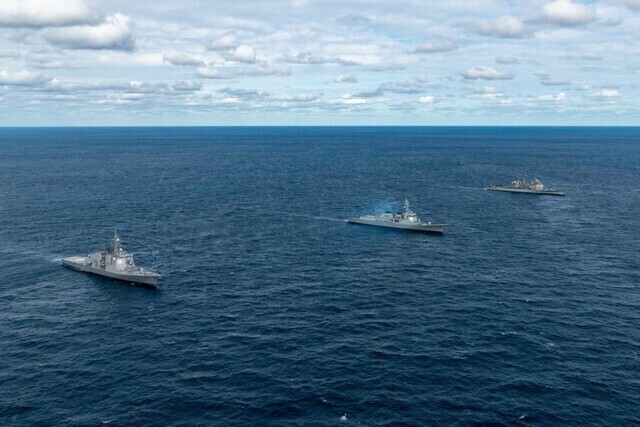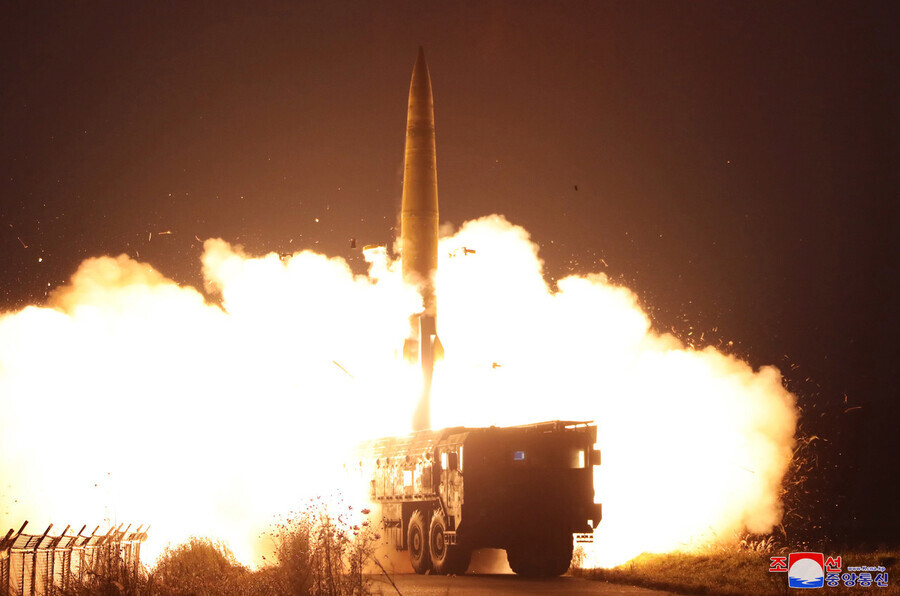hankyoreh
Links to other country sites 다른 나라 사이트 링크
Japan’s standards for use of preemptive counterstrike against N. Korea remain unclear

On Friday afternoon, Japan’s Prime Minister Fumio Kishida held a press conference after his Cabinet approved the revision of three documents, including the National Security Strategy, a move widely considered a massive recalibration of Japan’s foreign affairs and national security policy.
Towards the end of the question-and-answer session, one reporter posed a question that addressed a lingering uncertainty in regard to Japan’s ability to conduct strikes on enemy bases, which it will obtain with the revisions.
The Japanese government has stated that if it detects that an enemy will launch an attack on Japan, Tokyo will be able to put this ability into action. The question asked exactly what would be considered the beginning stages of an attack on Japan.
“Preemptive strikes violate international law,” the reporter said. “It’s extremely difficult to judge whether [an enemy strike] has been initiated.”
Kishida’s answer to the question was disappointingly vague. He stated that “there are several theories that can be used to determine whether a country is about to strike a different one,” and that “different countries use different methods to make that judgment.”
“Japan will make sure to adhere to international law, so it is important that Japan creates a detailed system that enables it to respond to threats within those legal boundaries,” the prime minister went on to say.
On the occasion that Japan goes ahead with a preemptive strike despite the target not having either the ability or the intention to attack them, not only does that contravene international law, but it could lead to the outbreak of war. This answer was the prime minister’s attempt to ensure the public that no such situation would come to pass.

Kishida could only give vague answers because of the fundamental limitations of Japan’s ability to strike enemy bases. In the revised National Security Strategy, Japan pointed out that North Korea has launched several ballistic missiles with irregular trajectories, which make them hard to intercept. Japan claims that these missiles mark “grave and imminent threats to Japan’s security.”
If Japan is to use this ability, it needs to accurately identify the location of the enemy’s soon-to-be-launched missile and make sure that this “enemy” is intentionally targeting Japan.
However, North Korea has been showing off its military prowess by using transporter erector launchers (TEL) and rail and submarine launchers to shoot off missiles with irregular trajectories, meaning it is hard to pinpoint with certainty where the missiles are.
Furthermore, it is almost impossible to determine whether North Korea seriously intends to attack Japan.
One hasty press of the button could lead to relentless retaliation from North Korea, so caution is key. As such, Yasukazu Hamada, Japan’s minister of defense, stated in response to a question he received about what constitutes the beginning stages of an enemy strike during a regular press conference on Dec. 6, that “it will be judged individually based on the international situation at the time, the other party’s stated intention, the means of attack, and the manner in which it takes place.”
For Japan to utilize this ability, it needs to make intelligence judgments and decisions with its ally, the US, which has abundant intelligence assets. Japan has repeatedly expressed its intention to jointly operate this ability with the US.
The Sankei Shimbun newspaper wrote on Sunday that “cooperation between Japan and the US is key, so as to avoid allies’ missed attacks or targeting the same enemy when the two countries exercise their strike abilities,” while adding that “there are voices in the US calling for the establishment of a joint command (US-Japan), like the South Korea-US alliance, and the integration of command-and-control systems.”
Whether it likes it or not, South Korea will have no choice but to strengthen trilateral cooperation and communication with the US and Japan, with the Americans acting as mediators, so as to prevent a misguided decision by Japan that could lead to war.
Moreover, numerous experts in Japan say that even though the government is underscoring the North Korean missile threat as its justification for being able to conduct strikes, they are in fact thinking about China, which is separated from Japan by only the Taiwan Strait.
In particular, the hypersonic missile with a range of 3,000 kilometers, which Japan is intending to develop, is thought to be a direct jab in China’s direction.
The Mainichi Shimbun daily quoted Toshiyuki Ito, a professor at the Kanazawa Institute of Technology’s Toranomon Graduate School and former member of the Japan Maritime Self-Defense Force, saying that Japan would only attack North Korea if “a second Korean War breaks out and North Korea fires missiles at US bases in Japan in an attempt to prevent Japan from coming to the aid of the US.”
Gen Jinbo, a professor of international relations at Keio University, also told the Asahi Shimbun that he predicted “the main body of response to North Korea is the South Korea-US alliance. Japan’s ability to counterattack will serve as an auxiliary role in their joint operation.”
However, he did add that “it is of great significance that Japan can now use its counterstrike capability as leverage to participate in the decision-making of South Korea-US joint operation plans.”
Now that Japan has secured military capabilities that it long lacked, South Korea finds itself in a difficult position. With too many chefs making the broth, it may spoil in a way that hurts Korea.
A South Korean Foreign Ministry official said on Friday that “close consultation and consent are essential for issues that have a significant impact on the security of the Korean Peninsula and our national interests, such as the exercise of counterstrike abilities on the Korean Peninsula.”
However, a Japanese government official said the same day that “the exercise of counterstrike capabilities does not mean that Japan will obtain permission from other countries while exercising its right to self-defense. These are decisions Japan will make independently.”
However, this official also said that Japan “will cooperate with the US and South Korea to collect and analyze information when we decide on whether we will exercise our counterstrike capability,” essentially suggesting that Korea should ease its anxieties on the matter by cooperating with Japan.
By Kim So-youn, Tokyo correspondent
Please direct questions or comments to [english@hani.co.kr]

Editorial・opinion
![[Editorial] Penalties for airing allegations against Korea’s first lady endanger free press [Editorial] Penalties for airing allegations against Korea’s first lady endanger free press](https://flexible.img.hani.co.kr/flexible/normal/500/300/imgdb/original/2024/0502/1817146398095106.jpg) [Editorial] Penalties for airing allegations against Korea’s first lady endanger free press
[Editorial] Penalties for airing allegations against Korea’s first lady endanger free press![[Editorial] Yoon must halt procurement of SM-3 interceptor missiles [Editorial] Yoon must halt procurement of SM-3 interceptor missiles](https://flexible.img.hani.co.kr/flexible/normal/500/300/imgdb/child/2024/0501/17145495551605_1717145495195344.jpg) [Editorial] Yoon must halt procurement of SM-3 interceptor missiles
[Editorial] Yoon must halt procurement of SM-3 interceptor missiles- [Guest essay] Maybe Korea’s rapid population decline is an opportunity, not a crisis
- [Column] Can Yoon steer diplomacy with Russia, China back on track?
- [Column] Season 2 of special prosecutor probe may be coming to Korea soon
- [Column] Park Geun-hye déjà vu in Yoon Suk-yeol
- [Editorial] New weight of N. Korea’s nuclear threats makes dialogue all the more urgent
- [Guest essay] The real reason Korea’s new right wants to dub Rhee a founding father
- [Column] ‘Choson’: Is it time we start referring to N. Korea in its own terms?
- [Editorial] Japan’s rewriting of history with Korea has gone too far
Most viewed articles
- 160% of young Koreans see no need to have kids after marriage
- 2Presidential office warns of veto in response to opposition passing special counsel probe act
- 3[Editorial] Penalties for airing allegations against Korea’s first lady endanger free press
- 4Months and months of overdue wages are pushing migrant workers in Korea into debt
- 5Alleged drug use by Korean A-listers rocks nation – but not for the first time
- 6Anti-immigration candidate marauds across Korea with squad detaining foreigners
- 7[Reporter’s notebook] In Min’s world, she’s the artist — and NewJeans is her art
- 8Hybe-Ador dispute shines light on pervasive issues behind K-pop’s tidy facade
- 9Japan says it’s not pressuring Naver to sell Line, but Korean insiders say otherwise
- 10[Column] Park Geun-hye déjà vu in Yoon Suk-yeol